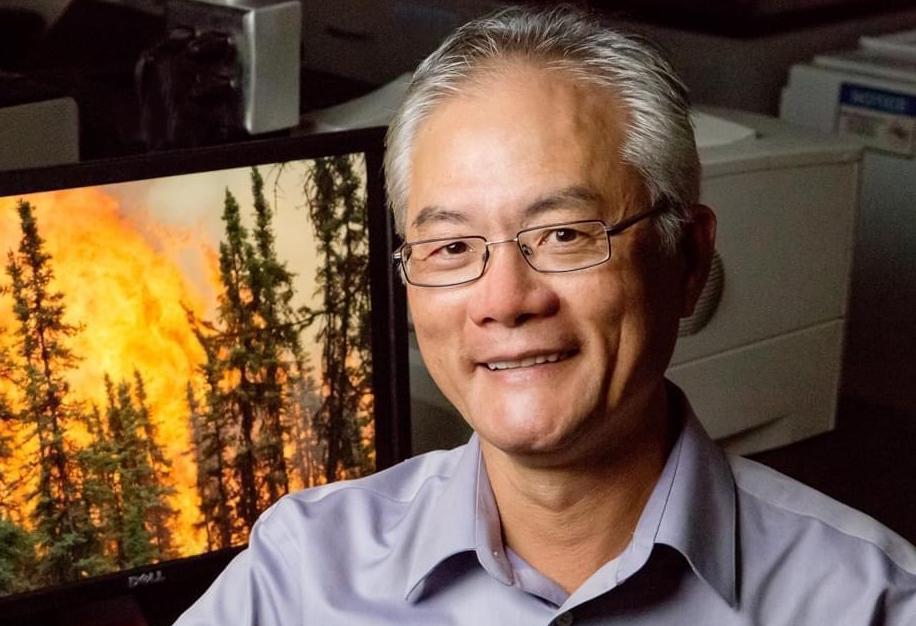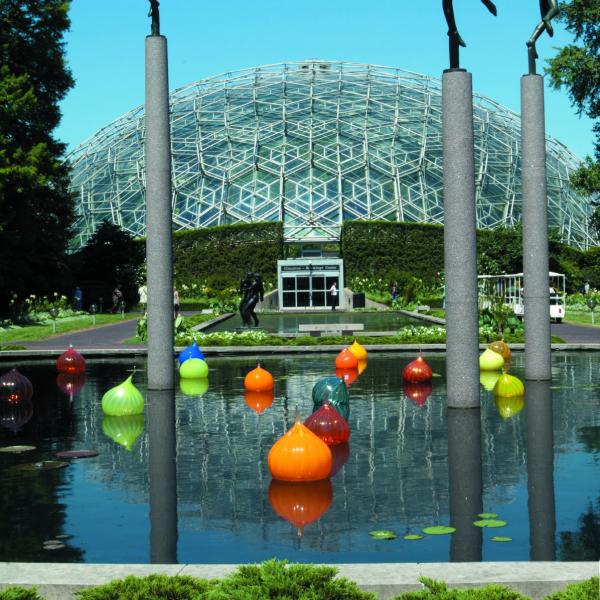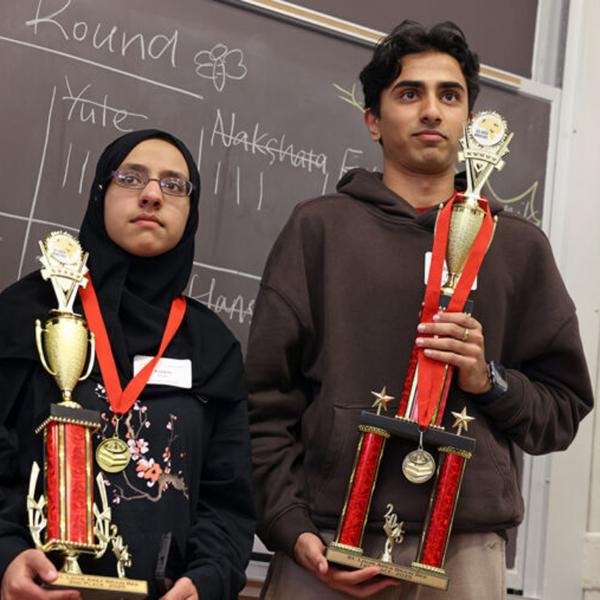Last week, Chancellor Andrew D. Martin announced that the next dean of the faculty of Arts & Sciences will be Feng Sheng Hu, the Harry E. Preble Dean of the College of Liberal Arts & Sciences at the University of Illinois at Urbana-Champaign.
Hu is a renowned interdisciplinary scholar with more than a decade of experience in academic administration. The Ampersand reached out to ask him about his research, his approach to leading a diverse academic institution, and why he’s excited to become a part of the WashU community.

What was your path to becoming an academic and interdisciplinary scholar?
I’m a first-generation college graduate. Until I was in my mid-20s, it never once crossed my mind that I'd become an academic. As a child, I wanted to become a professional musician, and I sang all the time. For me, becoming an academic was a process of self-discovery and perseverance that involved a few incredible mentors.
I was a biology student throughout my academic training. But I’ve always been a bit of an omnivore as a student and a scholar, curious about other areas of academic pursuit. My broad interests have served me well in my leadership roles where I have appreciated the abundant opportunities to learn from colleagues and students working on an extremely diverse range of topics.
You study long-term ecosystem dynamics and climate change. How did this field capture your attention?
I decided to become an academic because I found research on global change fascinating and because the research involved challenging field expeditions in remote areas of the Arctic. Evidence of human-induced climate change is pervasive in the Arctic, where I’ve now been doing research for 25 years. Areas with massive glaciers when I was a graduate student are now ice-free, large fires have occurred in Arctic ecosystems that had not experienced burning for thousands of years, and trees and shrubs have been expanding in coverage. I've continued to pursue climate science because these ongoing changes have profound societal and ecological implications.
“A college of arts and sciences is an ecosystem that thrives and prospers only if we truly value diversity and inclusion in all dimensions”
Are there any ways in which your work on ecosystem dynamics informs your approach to leading a liberal arts school with diverse disciplines?
In ecosystem science, one of the fundamental principles is that diversity begets productivity and sustainability. I often tell people that a college of arts and sciences is an ecosystem that thrives and prospers only if we truly value diversity and inclusion in all dimensions, from our academic disciplines to our people.
The perspective of long-term dynamics is also relevant. To give you an example, at Illinois, the humanities departments generated a large amount of extra revenue to support other units prior to the Great Recession of 2008, and now the social science departments are supporting some of the humanities and natural sciences units. The patterns of financial subsidies change over time – together we are stronger and more sustainable.
Finally, I’m a field ecologist, and I’ve led many field expeditions in remote areas, including the Alaskan Arctic and Africa. This required that I plan meticulously but also be prepared for unpredicted changes (e.g., an Arctic storm that may prevent us from flying to our field sites for days), and be adaptive and creative to tackle any issues that came our way. That same skill set is needed when one leads a large and complex organization.
What made you want to come to WashU?
I admire WashU for combining a first-class research enterprise with a deep commitment to excellence in undergraduate education. I see WashU as a public-serving private institution on a steep trajectory to becoming a global model in higher education. I applaud Chancellor Martin’s bold and progressive vision, and feel privileged that I’ll have the opportunity to help advance that vision.
What is your impression of the university so far?
The people are outstanding, and the campus is gorgeous. I’ve met many people representing various stakeholder groups in Arts & Sciences throughout the interview process. I enjoyed talking with them and thought they were exceptionally engaging, thoughtful, and forward-looking. I’m eagerly anticipating opportunities to interact with WashU’s students, faculty, staff, and alumni, and work with them to take Arts & Sciences to the next level.
Given the circumstances, you’ll have to get to know WashU from afar. Any thoughts on how you plan to do that?
I’ve been exchanging warm greetings with some of my new colleagues at WashU through email, and have begun to go through the onboarding process remotely. This will just make it so much more special when I get to interact with them in person when social distancing is over.
But frankly I’ve had to put my own transition from UI to WashU on the backburner. My leadership team here at UI has been working incredibly hard to make sure that our students continue to have a high-quality education and our faculty and staff are adequately supported in this global crisis.
“I see WashU as a public-serving private institution on a steep trajectory to becoming a global model in higher education”
What takeaways have you gathered so far as you've helped lead your current institution through the COVID-19 pandemic?
Needless to say, it’s deeply concerning to watch the COVID-19 crisis unfold in the world. The pandemic is a powerful illustration, in a sad and frightening way, that the world is interconnected and we are one global community.
One silver lining is that it has showcased the strengths of our community. Many of our colleagues have stepped up and worked long hours to help local hospitals expand and expedite COVID-19 testing; we successfully transitioned to online teaching and remote learning; and our faculty and staff have worked so incredibly hard to try to serve our students to the best of our ability under extraordinarily difficult circumstances. Our people are creative, compassionate, and resilient in dealing with these unprecedented demands.
As a teacher, I imagine that one day in the future the COVID-19 pandemic will make for an excellent case study in the textbooks of many subjects: biology, sociology, economics, and data science, to name a few.
What inspires you the most in your work as an academic leader?
Conceptualizing projects to advance faculty excellence and enhance the student experience, thinking about how to collaborate with colleagues to turn those projects into reality, and working together to make them happen! I think this process is analogous to writing a research grant proposal that leads to discovery and innovation, which I’ve done many times as a scholar. It requires creativity, imagination, a broad perspective, and the ability to communicate and collaborate with others – some of the key traits that we want our students to acquire from a liberal arts education.
Tell us about your family. Are you all excited to relocate to St. Louis?
We are an international and outdoorsy family. My wife, Sumi, is a native of Japan, and we have two children, Acadia and Brooks. I’m an avid hiker, and my family and I have turned most of our vacations into hiking trips in the mountains. We are excited about having easy access to some great hiking areas in southern Illinois and Missouri!
We are all excited about St. Louis. My wife and I used to take our children to visit the zoo, the botanical garden, and the City Museum regularly, so we already know some of the wonderful things St. Louis has to offer. We are looking forward to exploring the city.




